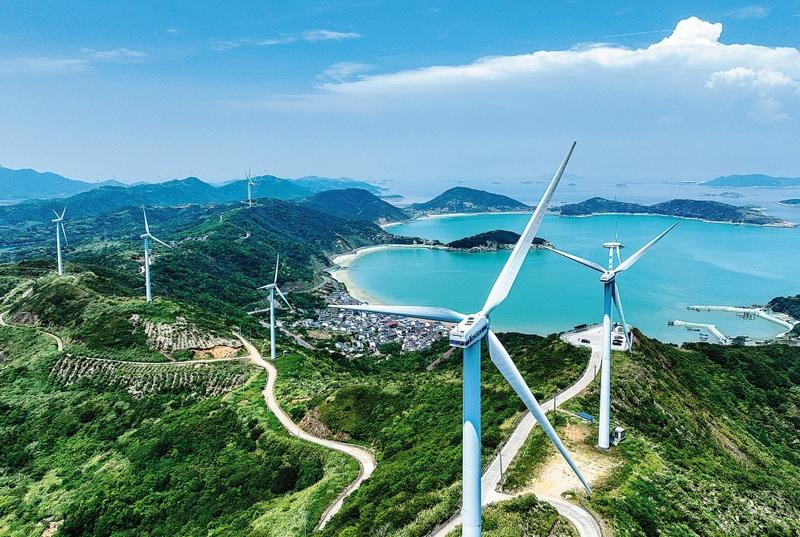Implementation of existing climate goals needs to trump raising new ones: official
 A wind farm generates power for grids in Zhoushan, Zhejiang province, on Aug 6, 2022. (YAO FENG / FOR CHINA DAILY)
A wind farm generates power for grids in Zhoushan, Zhejiang province, on Aug 6, 2022. (YAO FENG / FOR CHINA DAILY)
China has called on parties to focus on the implementation of goals that have already been set ahead of the COP 27 United Nations climate change conference, instead of merely paying lip service to raise ambitions.
Li Gao, director of tackling climate change at the Ministry of Ecology and Environment, made the remark at a news conference on Thursday in the lead-up to the UN gathering in Sharm el-Sheikh, Egypt from Nov 6 to 18, the slogan of which is "Together for Implementation".
Li called on parties to fully and faithfully implement the principles and targets in the 1992 United Nations Framework Convention on Climate Change and its 2015 Paris Agreement to jointly build a global climate governance system that is fair, rational, cooperative and beneficial to all.
While the principle of common but differentiated responsibilities is inscribed into both the convention and the agreement, the 2015 treaty aims to keep the global temperature increase this century below 2 C from preindustrial levels and to pursue efforts to limit the temperature increase even further to 1.5 C.
Currently, most countries have announced their targets for post-2020 climate actions under the Paris Agreement, he said.
It's important to come up with these targets, but what is even more important is to take concrete actions to bring the targets into reality. "This is the fundamental solution to effectively cope with global climate change," he said.
COP 27 should call on parties to transform their targets into effective policies, solid actions and concrete projects, instead of raising new targets when no adequate effort has been made to implement their previous ones, he stressed.
"We believe shouting empty slogans doesn't mean ambition, and what can demonstrate ambition is to implement the targets," he stressed.
Li also called on COP 27 to address the key concerns of developing nations about climate adaptation and financial support.
"The conference is to be held in a developing nation. It should practically respond to concerns of developing states," he stressed.
Climate adaptation is a key concern of developing nations, the official said. The issue, however, hasn't been given adequate importance in the global multilateral climate process.
Li called for concrete progress in COP 27 to lay a solid basis for reaching an ambitious and implementable global target for climate adaptation in COP 28 next year.
"Developed countries should beef up financial support for climate adaptation actions in developing nations and come up with a road map to double the adaptation fund," he said.
In 2009, developed countries pledged to mobilize $100 billion per year by 2020 to support climate action in developing countries. The promise, however, has yet to materialize, Li said.
This has not only adversely affected and hindered developing nations to carry out climate actions, but also severely undermined the political trust between developed and developing nations, he said.
"We urge developed countries to materialize the $100 billion support per year, other than to submit a report at COP 27 that seeks reasons and excuses for the long-overdue financial support," he said.
He said developed nations should, with the $100 billion support per year as a starting point, hammer out a more ambitious road map for 2021-25 climate fund support and an updated post-2025 target to enhance the trust between developed and developing countries, and the global synergy in climate actions.


